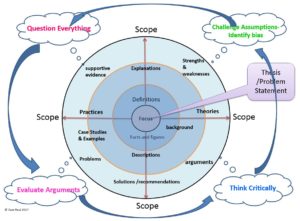Students often believe that before they begin an assignment, they should read as much as possible around a topic until they feel 'ready' to start writing. This is NOT a good idea, as it is highly likely you will find yourself completely bogged down in a mess of ideas.
You should always read for a specific and targeted purpose, with an aim to build up a clear picture, piece by piece (like a jigsaw). In this way you will be able to
- filter out the noise
- select more relevant and useful texts
- stay focused and on target
- build your confidence around the assignment topic and task
Getting started on your research reading - filling in the jigsaw
When you select a potentially useful text, you should ask:
- Why have I selected this text?
- Is it relevant to my assignment? If so, how and why?
- What type of information is it? (e.g. informative, argument, example, data etc)
- Where will it fit in my assignment (i.e. where can I slot it into my plan)
Generating research questions
Your purpose is set by your assignment task and type. It may be an essay, which asks you to investigate a specific focus area or problem, or a technical report, where you have to investigate and build on previous research.
The next step, therefore is to generate a set of questions prompted by your assignment. These questions can range from simple definition and description types (what? how? when? etc) - to more detailed and complex critical questions (why? in what ways? etc).
These questions give you a springboard into your research.
Begin with the easy questions, and move through to the more complex. As you find specific answers, you will:
- slowly build up your understanding, in manageable chunks
- fill in the gaps in your knowledge
- unearth more details about the topic that may lead to further questions
- be able to slot in your Q&As into your assignment plan.
Jigsaw research process
Here is a diagram that illustrates how the jigsaw research process works.

Focus = thesis/problem or research statement / specific purpose of your assignment
Scope = The limits of your research, set (or suggested) by the assignment question or task
You should also be continually questioning everything you read (bubbles), and be on the lookout for problems/holes/ flaws in evidence and arguments presented in the text.
By following this logical and systematic approach you will hopefully take control of your research reading and significantly reduce workload and stress levels.
Hopkins, D. and Reid, T., 2018. The Academic Skills Handbook: Your Guide to Success in Writing, Thinking and Communicating at University. Sage.
Respond


